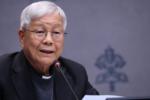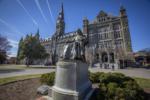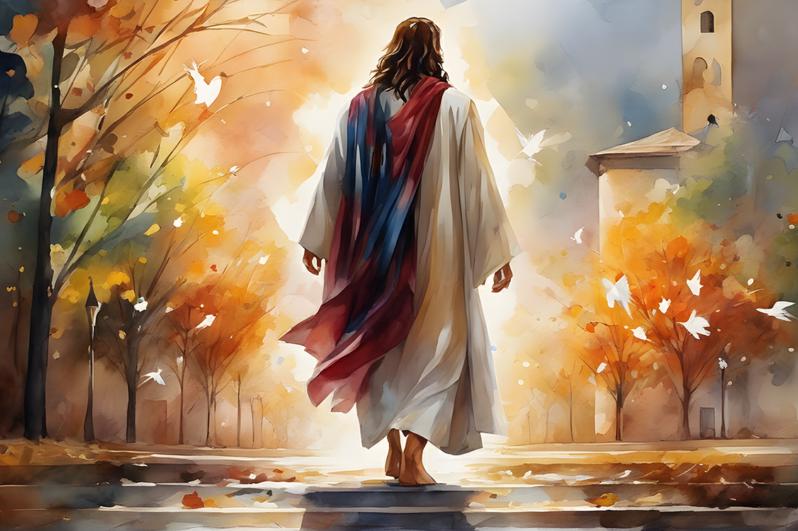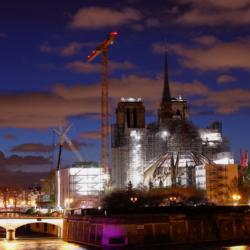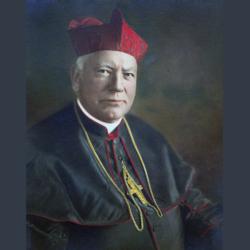The new Temple: How Easter changes religion
"Destroy this temple, and I will rebuild it in three days." This mysterious statement led, in part at least, to Christ's death, brought forward in the conflicting witness of his trial before the Sanhedrin. This group recognized Jesus as a threat to the religious status quo. The Evangelists make clear that Jesus referred to the Temple of his Body, but the authorities correctly understood it as a prophecy that a new Temple would overturn the old. Jesus brought something new, something that would displace the old way of doing things, not only in Judaism but in all of religious history.
We tend to think of "religion" as a bad word and might ask, "Didn't Jesus get rid of that old thing?" If so, what would take religion's place? We often hear, "I am spiritual, not religious." Instead of relying on other people and all those rules, another independent way to God must be found. The irony, however, is that "finding our own way" to God could be considered the definition of religion.
Human beings are religious beings. Throughout history, we have always recognized an order within us to something beyond. True, this transcendent sense often remained vague, but it inspired a quest for meaning -- where do we come from, where are we going, how do I live a good life? -- and an attempt to overcome the darkness of human life. Faced with the reality of suffering and death, humans have initiated religious rituals to atone for sin, obtain divine favors, and establish a path to everlasting life.
The history of religion, from this point of view, remains tragic. Human contemplation can arrive at certain knowledge that God exists but cannot know him in himself or establish any direct relationship with him. No amount of sacrifice of any earthly good can atone for sin. There is no bridge that we can build into heaven. Our religious nature meets a dead end, even expressed as the aimless spiritual search of modern people. Because God remains unknown, the search largely focuses on myself: my thoughts, desires, and aspirations.
Pope Benedict XVI, in the second volume of "Jesus of Nazareth," points to an unexpected but "decisive turning point in the history of religions": Jesus's cleansing of the Temple (Ignatius Press, 2011, 148). Even though God established the worship of the Old Covenant, it was not enough to bring humanity into close communion with God. Jesus not only cleansed the Temple of the abuse of the money changers, driving them out with a cord; he also pointed to the need for something fundamentally new. Not an absence of religion, but one that arises from God's own initiative toward us and that draws us into communion with him.
The cleansing of the Temple pointed to the need for a new Temple without the limits of its prototype. To enter it, one need not travel to Jerusalem, purchase animals to sacrifice, and remain in the outer court while only the priests enter within. No, in the new Temple that Jesus erected in his Resurrection, we can enter into the holy of holies with him. Jesus's cleansing showed that "the Temple of stone must be destroyed, so that the new one, the New Covenant with its new style of worship, can come. Yet at the same time, this means that Jesus must endure crucifixion, so that, after his Resurrection, he may become the new Temple" (ibid., 170). In the death of Jesus, the whole old order of religion passed away, with its grasping after God, and a new way to the Father was opened up in the transformed life he took up at Easter.
Easter means that we don't have to find our own way anymore, futile as this attempt had always been. In place of our blind groping after meaning, Jesus gives us a relationship with the Father. He doesn't just give us some part of the truth or a limited share in his life. He pours out everything that he has received from the Father, letting it flow into our hearts through his Holy Spirit. This is the answer to our search for meaning and the communion we have longed for ever since we lost our original innocence.
Jesus himself described this drastic shift in religious history. The Gentiles did not know God, while the Jews who knew him could not relate to him as sons. Speaking to the Samaritan woman, Jesus lays out his new religious plan: "Woman, believe me, the hour is coming when neither on this mountain nor in Jerusalem will you worship the Father. You worship what you do not know; we worship what we know, for salvation is from the Jews. But the hour is coming, and now is, when the true worshipers will worship the Father in spirit and truth, for such the Father seeks to worship him. God is spirit, and those who worship him must worship in spirit and truth" (Jn 4:21-24). Religious worship does not disappear, but it becomes inflamed from within by God's own presence within us that enables us to reach our final destination: the Father's love.
The new Temple is not a place but a Person, showing us that the new religion of Jesus focuses on relationship above all else. It does not get rid of religious ritual, such as the Eucharistic sacrifice of his Body, nor moral action, such as his Beatitudes or the works of mercy. Instead, he situates them in relation to the Father. We come to the Father through him, as he draws us into communion with him as members of his Body, enabling us not simply to imitate him but to become one with him.
Want to be spiritual? You will need to be religious too, but within a religion of the Spirit. Jesus is the way to the Father, and we walk that way enlivened by the living presence of God within us, making us a temple of God, a stone within the new Temple erected by Jesus in his Body. The new religion moves us out of ourselves in love -- not a self-seeking love that uses spirituality to prop up one's own emotions and desires, but a love that pulls us into happiness beyond our imagination: union with the most Holy Trinity. All of history, and even our current restlessness, points us to the great work of Easter: a re-creation of all humanity, including our religious longing, into his new, eternal Temple.




